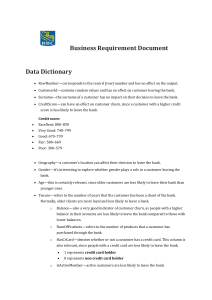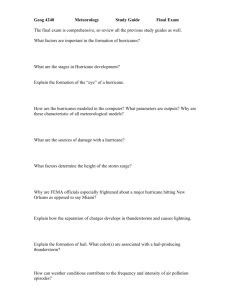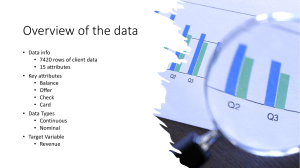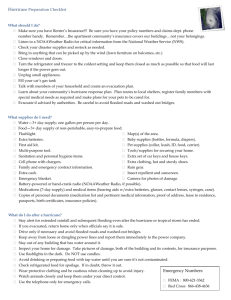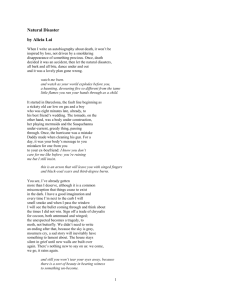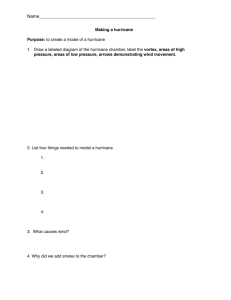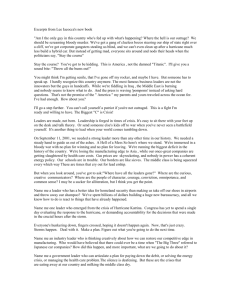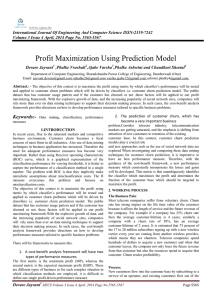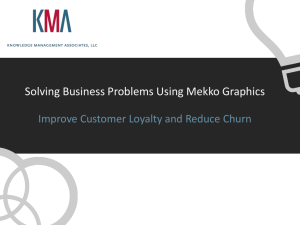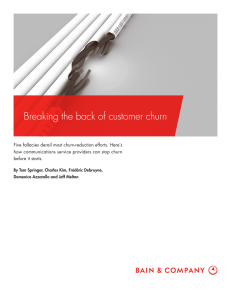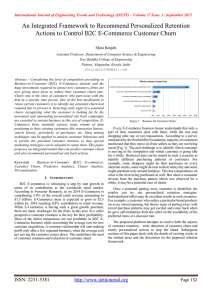Special Topics *International Business and Enterprise*
advertisement
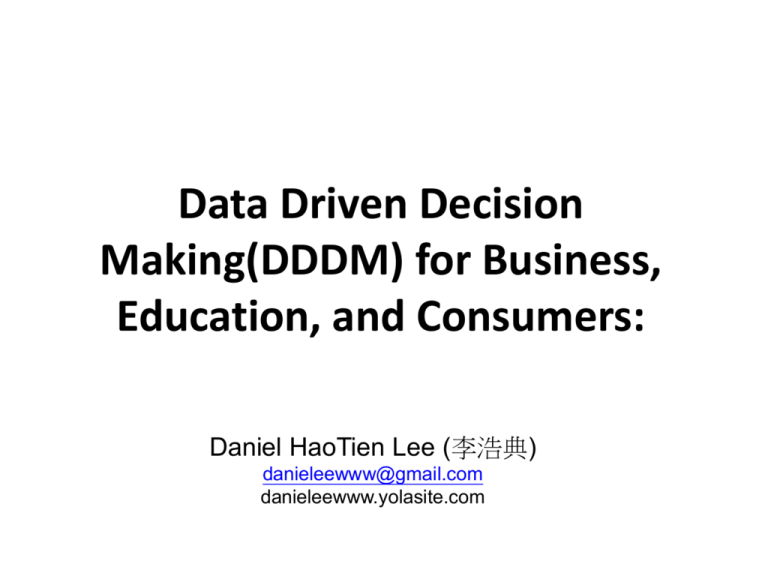
Data Driven Decision Making(DDDM) for Business, Education, and Consumers: Daniel HaoTien Lee (李浩典) danieleewww@gmail.com danieleewww.yolasite.com DDDM • “The practice of basing decisions on the analysis of data rather than purely on intuition.” Equally succinctly, data science “as the connective tissue between dataprocessing technologies (including those for big data) and data-driven decision making.” http://blogs.wsj.com/cio/2013/09/27/data-driven-decision-making-promises-and-limits/ Data Science 101 Courtesy of Bill Cowe, U. of Washington Cases Hurricane Hit : What to be stored heavily in Wal-Mart ? Case 1 • Hurricane Frances was on its way, barreling across the Caribbean, threatening a direct hit on Florida's Atlantic coast. Residents made for higher ground, but far away, in Bentonville, Ark., executives at Wal-Mart Stores decided that the situation offered a great opportunity for one of their newest data-driven weapons…predictive technology. • A week ahead of the storm's landfall, Linda M. Dillman, Wal-Mart's chief information officer, pressed her staff to come up with forecasts based on what had happened when Hurricane Charley struck several weeks earlier. Backed by the trillions of bytes' worth of shopper history that is stored in Wal-Mart's data warehouse, she felt that the company could “start predicting what's going to happen, instead of waiting for it to happen,” as she put it. Case 1_ cont. • It would be more valuable to discover patterns due to the hurricane that were not obvious. To do this, analysts might examine the huge volume of Wal-Mart data from prior, similar situations (such as Hurricane Charley earlier in the same season) to identify unusual local demand for products. From such patterns, the company might be able to anticipate unusual demand for products and rush stock to the stores ahead of the hurricane's landfall. • Indeed, that is what happened. The New York Times reported that: “… the experts mined the data and found that the stores would indeed need certain products—and not just the usual flashlights. ‘We didn't know in the past that strawberry Pop-Tarts increase in sales, like seven times their normal sales rate, ahead of a hurricane,’ And the pre-hurricane top-selling item was beer. Churn Rate Case 2 • Assume you just landed a great analytical job with MegaTelCo, one of the largest telecommunication firms in the United States. They are having a major problem with customer retention in their wireless business. In the mid-Atlantic region, 20% of cell-phone customers leave when their contracts expire, and it is getting increasingly difficult to acquire new customers. Since the cell-phone market is now saturated, the huge growth in the wireless market has tapered off. Communications companies are now engaged in battles to attract each other's customers while retaining their own. Customers switching from one company to another is called churn, and it is expensive all around: one company must spend on incentives to attract a customer while another company loses revenue when the customer departs. Case 2_ cont. • You have been called in to help understand the problem and to devise a solution. Attracting new customers is much more expensive than retaining existing ones, so a good deal of marketing budget is allocated to prevent churn. Marketing has already designed a special retention offer. Your task is to devise a precise, step-by-step plan for how the data science team should use MegaTelCo's vast data resources to decide which customers should be offered the special retention deal prior to the expiration of their contracts. Specifically, how should MegaTelCo decide on the set of customers to target to best reduce churn for a particular incentive budget? Answering this question is much more complicated than it seems initially. Case 2_ cont. • What variable gives us the most information about the future churn rate of the population? – Being a professional? Age? Place of residence? – Income? Number of complaints to customer service? Amount of overage charges? Addressing the Churn Problem with Tree Induction • For this example, we have a historical data set of 20,000 customers. At the point of collecting the data, each customer either had stayed with the company or had left (churned). Each customer is described by the variables listed in Table Churn attributes from Table 3-2 ranked by information gain Classification tree learned from the cellular phone churn data DDDM and Intuition: Education • Decision making based on intuition, tradition, or convenience – – – – – – – – – Scattered staff development programs Budgetary decisions based on prior practice or priority programs Staff assignments based on interest and availability Reports to the community about school events Goal-setting by board members, administrators, or teachers based on votes, favorite initiatives, or fads Staff meetings that focus on operations and the dissemination of information Parent communication via twice-a-year conferences, open-houses and newsletters Grading systems based on each teacher’s criteria of completed work and participation Periodic administrative team meetings focused solely on operations Paradigm Shift to Data-Driven Decision Making: Education • Focused staff development programs as an improvement strategy to address problems/needs identified by data • Budget allocations to programs based on data-informed needs • Staff assignments based on skills needed as indicated by the data • Organized factual reports to the community about the learning progress of students • Goal-setting based on data about problems and possible explanations • Staff meetings that focus on strategies and issues raised by the local school’s data • Regular parent communication regarding the progress of their children with specific data • Grading systems based on common criteria for student performance that reports progress on the standards as well as work skills • Administrative team meetings that focus on measured progress toward data-based improvement goals Human Brain Project • https://www.humanbrainproject.eu/ • http://bluebrain.epfl.ch/ • https://brainscales.kip.uniheidelberg.de/public/index.html Ultimately, the long-term goal is to build artificial brains that are inexpensive enough to outperform traditional von Neuman supercomputers at a fraction of the cost.
